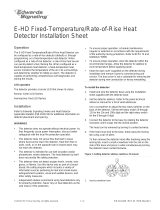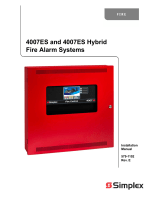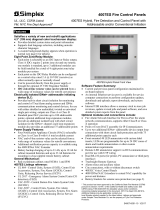Page is loading ...

© 2013 UTC Fire & Security. All rights reserved. 1 / 2 P/N 3101190 • REV 03 • REB 25JAN13
E-IDC1B Analog Single Input Mini Module
Installation Sheet
Operation
The E-IDC1B Analog Single Input Mini Module is an analog
addressable device used to connect a normally open, alarm,
supervisory, or monitor type dry contact initiating device
circuit (IDC) to a control panel. This module is designed for
Class B circuit operation.
The device address is set using the two rotary switches
located on the front of the module. One device address is
required.
The module is factory set to operate as an alarm-latching
device. When the NO contact of an initiating device is
closed, an alarm signal is sent to the control panel and the
alarm condition is latched at the module.
Additional device types are available through front panel
programming or the configuration utility. For additional
information, refer to the documents listed on the control
panel label.
LEDs
The provides two status LEDs. The LEDs are visible from
the back of the module.
Figure 1: LED location
21
1. Red LED: Alarm/active
2. Green LED: Normal
Installation
WARNINGS
• This module does not operate without electrical power.
As fires frequently cause power interruption, discuss
further safeguards with the local fire protection
specialist.
• This module does not support conventional two-wire
smoke detectors.
Note: The module is shipped from the factory as an
assembled unit; it contains no user-serviceable parts and
should not be disassembled.
To install the module:
1. Verify that all field wiring is free of opens, shorts, and
ground faults.
2. Make all wiring connections as discussed in “Wiring”
and shown in Figure 3.
3. Set the required device address. For example, to set the
device address for 21, set the TENS switch (marked 0
to 12) to 2 and the ONES switch (marked 0 to 9) to 1.
See Figure 2.
The devices can be addressed from 01 to 129. Panel
addressing may vary.
4. Position the module into the electrical box, behind the
device to which it connects.
Figure 2: Module address
1
0
1
2
3
4
5
6
12
11
10
9
8
7
0
9
1
2
3
4
5
6
7
8
1. Insert screwdriver here

2 of 2 P/N 3101190 • REV 03 • ISS 25JAN13
Wiring
Wire in accordance with NFPA 72 and CAN/ULC-S524,
Standard for the Installation of Fire Alarm Systems and in
accordance with the local authorities having jurisdiction.
Be sure to observe the polarity of the wires as shown in
Figure 3.
All wiring is power-limited and supervised.
This module does not support two-wire smoke detectors.
Figure 3: Module wiring
47
EOL
k Ω
( )
0
1
2
3
4
5
6
12
11
10
9
8
7
0
9
1
2
3
4
5
6
7
8
3
2
4
1
1. Refer to the control panel technical reference manual for wiring
specifications
2.
Wire nut or other listed splice connector or terminal block
3.
Style B (Class B)
4. Typical NO initiating device
Specifications
Voltage
IDC maximum
Communication line
maximum
10 VDC at 350 µA
20.6 V peak-to-peak
Current
Standby
Activated
350 µA
500 µA
Ground fault impedance
10 kΩ
Initiating device circuit (IDC)
EOL resistor value
Circuit resistance
Circuit capacitance
47 kΩ, (P/N EOL-47)
50 Ω (25 Ω per wire), max.
0.1 µF, max.
Operating environment
Temperature
Relative humidity
32 to 120°F (0 to 49°C)
0 to 93%, noncondensing
Storage temperature range
–4 to 140°F (–20 to 60°C)
Regulatory information
Manufacturer
Edwards, A Division of UTC Fire & Security
Americas Corporation, Inc.
8985 Town Center Parkway, Bradenton, FL
34202, USA
Year of
manufacture
The first two digits of the product serial number
(located on the product identification label) are
the year of manufacture.
Environmental
class
UL: Indoor dry
Nort
h American
standards
UL 864; CAN/ULC-S526
Contact information
For contact information, see our Web site:
www.edwardssignaling.com.
/






